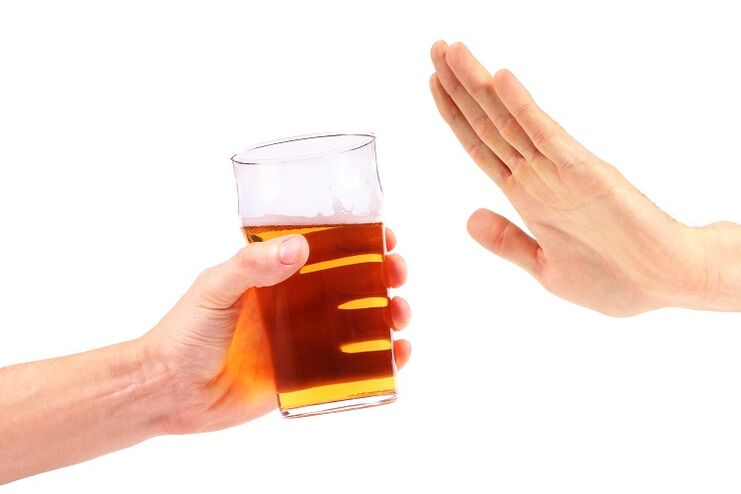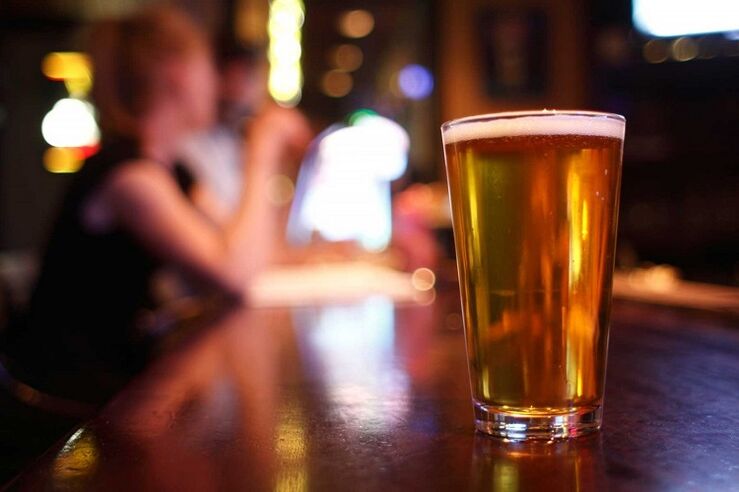At the end of a hard day at work, you want to relax with a glass of wine or a can of beer. It seems, what will happen if you drink alcohol "for pleasure" every day?
The so-called "evening alcoholism" does not provoke open disapproval of society. At first glance, nothing bad is happening: there is no instant withdrawal syndrome from a glass of vodka. But frequent use of alcohol affects the human body, regardless of the "elite" of the drink. Young, successful people aged 25-40, who buy expensive cognac, do not even notice the last link in the chain of alcohol that stands in the same row with them - an unshaven stumbled man in crumpled clothes. If you hint that this is your possible future, he will surely be offended. However, if a person drinks alcohol every day, he will soon have to pay not only with money, but also with health, family ties and position in society.
The insidiousness of ethyl alcohol
The amount of alcohol consumed in terms of pure alcohol should not exceed 5 ml / day (women) and 10 ml / day (men). It is best to divide it into several tricks. That is, 25 ml of spirits, 100 ml of wine, 250 ml of 3-4% beer drunk at the festive table will not cause devastating damage to the female body (for men, this amount is doubled). However, the frequency of using even such "harmless" doses makes them dangerous.
The destruction of the body begins gradually. It directly depends on age, health, weight, hereditary predisposition. With the unfavorable coincidence of these factors, the first phase of alcoholism can occur in six months or a year. And a person who abuses alcohol will spend the rest of his life in alcohol.

Mental changes
Because daily alcohol use is aimed at rapidly achieving a psychotropic effect ("relaxation"), psychological dependence occurs first. After a week, a person gets used to relieving stress in this way, without a sobering break, and after a year he forgets that it could be different.
The main symptoms of what is happening in the body:
- Insomnia. Despite the strong hypnotic effect of ethanol, the phases of healthy sleep under its influence are disrupted. The dream becomes either narcotic or vice versa - short, restless. After that, the person has to drink alcohol just to fall asleep.
- Nervousness and irritability. The constant presence of alcohol in the blood causes the brain to starve for oxygen. Along with sleep disorders, this leads to fatigue that causes earlier drinking. This is how the "vicious circle" is created.
- Lowering the criticality threshold. The person begins to react sharply to comments ("Yes, I drink all the time, but what’s so terrible about that? "), Constantly finding new reasons to drink.
- Look for a reason. Gradually, festive feasts and small doses are replaced by copious drinks on TV every night. The patient is willing to blame the whole world for having a formal reason to take another dose.
- Growing aggression. In the first and second phase of alcoholism, most domestic crimes occur. Imaginary courage makes you look for adventure, the case often ends in a fight.
Physiological changes
The consequences of long-term alcohol intake are irreversible disorders in the body.
- Change in blood composition. Literally a few hours later, glucose levels decrease, thrombus formation increases, and blood circulation deteriorates.
- Avitaminosis. Against the background of general intoxication, vitamin deficiency seems to be a small problem. However, it gradually leads to hair loss, destruction of tooth tissue, indigestion and reduced immunity. Perhaps the development of anemia, early dementia, acute clinical depression.
- The effect of aging. The classic signs of alcoholism are swelling of the face, vascular "stars" on the cheeks, pale or purple-cyanotic skin. The person looks 10-15 years older than the passport. The appearance of women is changing especially fast.
- Destruction of nerve cells and tissues of internal organs. It is absorbed through the esophagus, ethanol with the bloodit spreads to every cell of the body, gradually affecting the liver, kidneys, stomach, brain.
Big belly and thin legs - all are the "sweets" of beer alcoholism
Beer is one of the most insidious drinks. The shops offer a large selection of a wide range of varieties, the advertisements call for "cooling". Initially, low psychological alertness, caused by strong alcohol, leads to an increase in domestic beer alcoholism.
Unlike vodka, beer has a lower calorie content, is easier to tolerate and has a mild hangover syndrome. However, if you drink it daily, the effects will be the same.
The elements that beer contains affect the production of hormones. In men with beer addiction, breasts grow, fat accumulates on the abdomen and hips, the tone of voice becomes stronger, impotence develops. If a woman drinks a lot of beer, she acquires masculine qualities: her voice coagulates, the antennae begin to grow above the upper lip, the figure becomes stocky, masculine.
Beer alcoholism gradually destroys the hormonal system. Infertility, thyroid tumors, diseased pancreas - this is just a small list of problems due to the abuse of fizzy drinks.
But beer has the most detrimental effect on the heart. In people who occasionally drink up to 3-5 liters of beer a day, the volume of the heart muscle increases several times. The so-called "bovine heart" effect occurs, which doctors call cardiomegaly. Muscle tissue gradually degenerates, shortness of breath occurs, heart rhythm is disturbed. In the future, the "bull's heart" threatens serious complications.

It is important to remember that small doses of ethanol in beer lead to the creation of alcohol dependence. It's just that it's much harder for him to track down.
Is it true in wine?
Speaking of the relative usefulness of wine, doctors think of drinks that are products of grape fermentation, strength not exceeding 13%. A glass of dry wine a week will not do any tangible damage.
However, excessive passion for them has the same sad consequences that occur when consuming alcohol. Wine causes the destruction of the limbic system of the brain, responsible for memories and emotions. Wine abuse leads to memory loss, dementia, premature dementia and impaired consciousness.
Red wine is contraindicated for migraines, high blood pressure, diabetes, gastritis. White wine has a negative effect on the pancreas and nerve cells in the brain.
Dessert wines are high in calories, the combination of sugar and preservatives worsens the negative properties of ethanol.
Champagne wines, due to their saturation with carbon dioxide, accelerate the absorption of alcohol into the blood. How much can a man drink at a festive table so as not to get drunk on champagne? Literally one glass. Furthermore, an individual reaction can be unpredictable.
Alcohol and chemistry
Can I drink low-alcohol beverages in parallel with taking medication? The medical answer will be categorical: no!
Even "harmless" antipyretics like aspirin and paracetamol, in combination with ethanol exposure, can cause sudden gastric bleeding or anaphylactic shock.
During treatment, it is worth giving up even small doses of alcohol in the evening. Ethanol increases the resistance of pathogenic bacteria to antibiotics, increases the side effects of many drugs. Moreover, the disease itself is a contraindication.
You should not experimentally find out what will happen if you drink alcohol while taking medication. There is a high probability of complications, up to fatal.
Environmental Record
It is worth worrying if:
- your loved one drinks more alcohol every day (including low-alcohol drinks);
- became irritable, nervous;
- has symptoms of intoxication (hangover syndrome);
- complains of depression, insomnia, nightmares;
- no vacation in the house passes without alcohol.
When the first symptoms appear, it is important to convey to the person the need for treatment. However, you cannot talk to an alcoholic if he is under the influence of intoxicants or suffers from a hangover. Choose the right moment, do not insist, speak calmly, quietly. Seek professional help if necessary.
Remember: if one of the spouses drinks alcohol, there is a danger that the other spouse will become addicted.
























